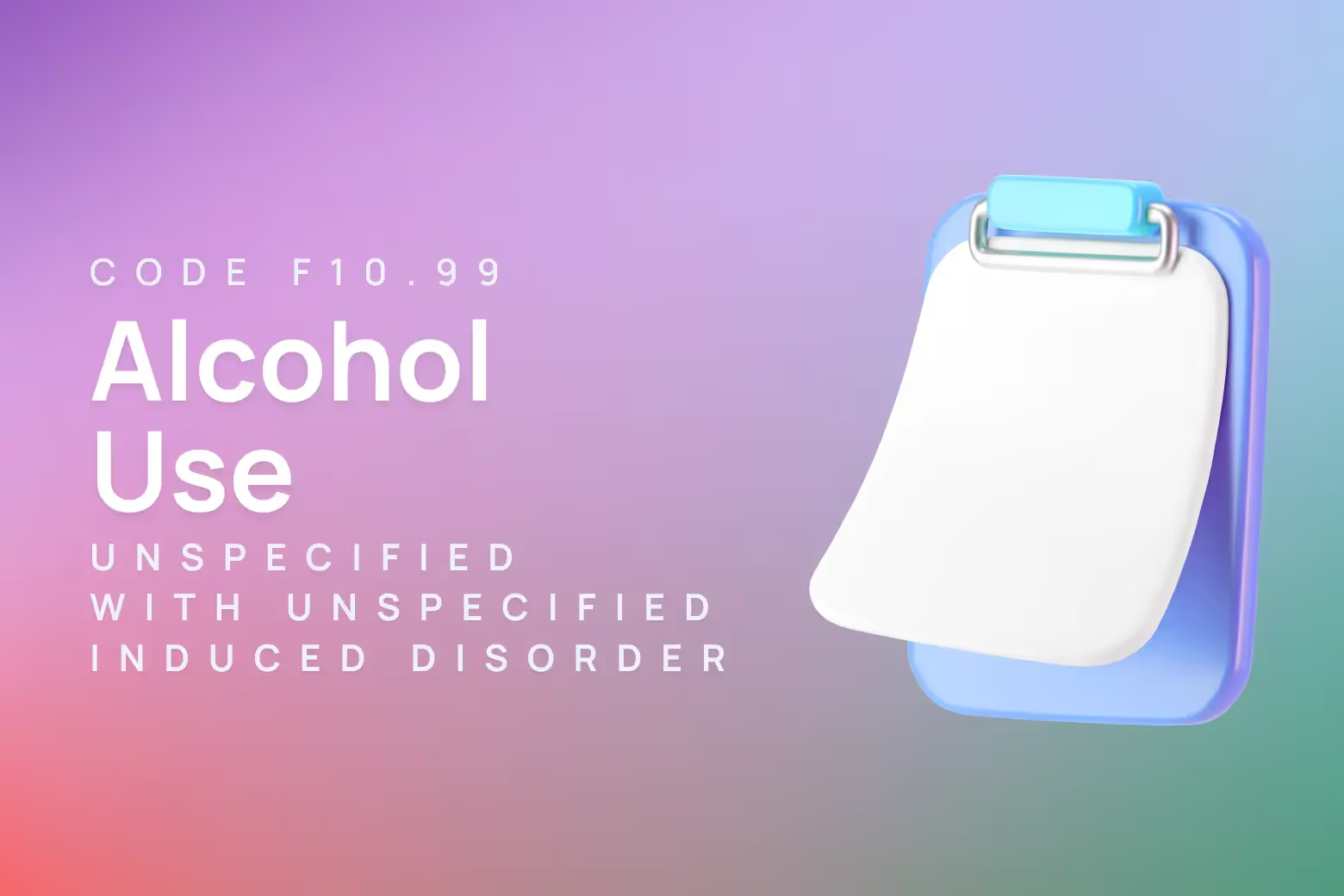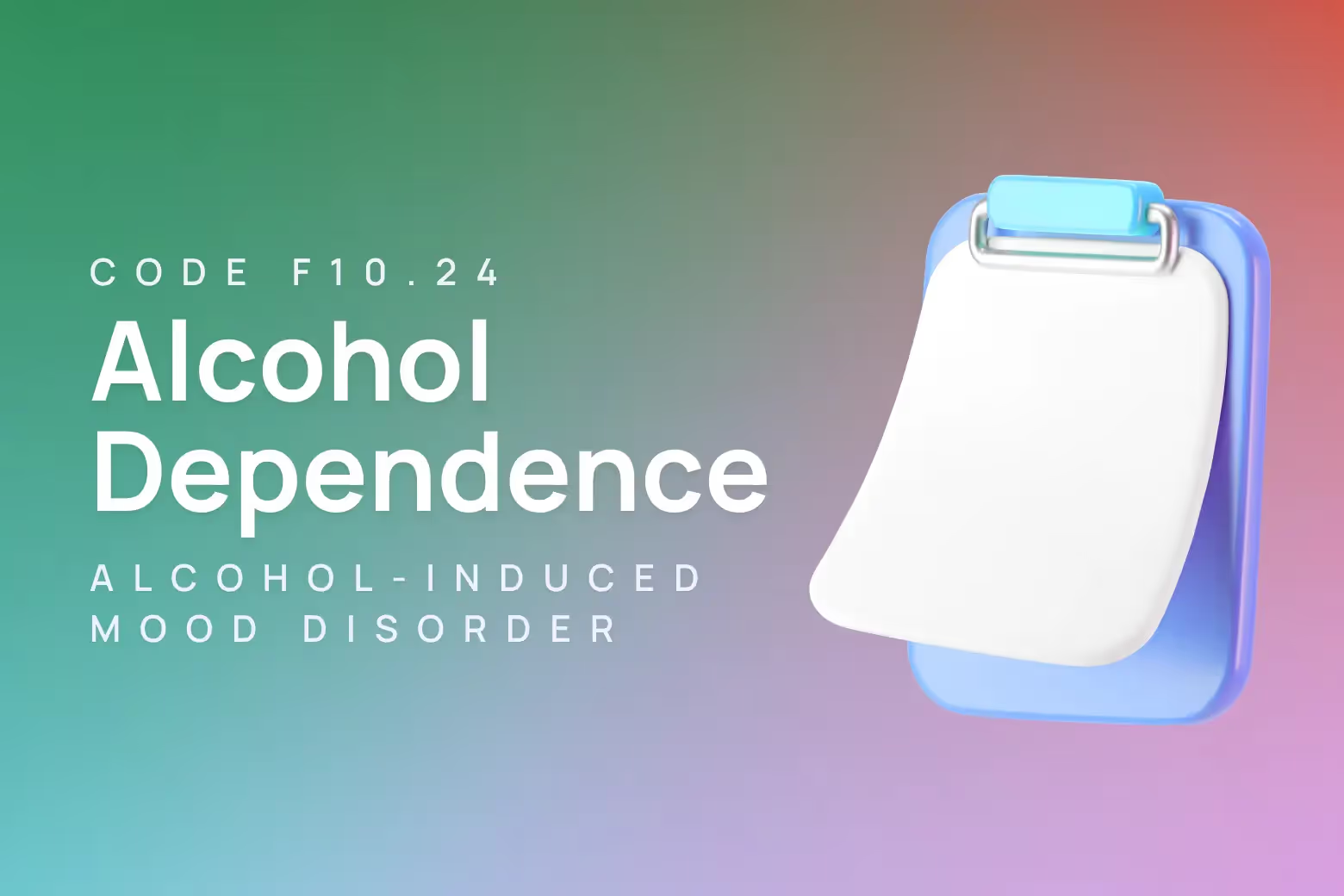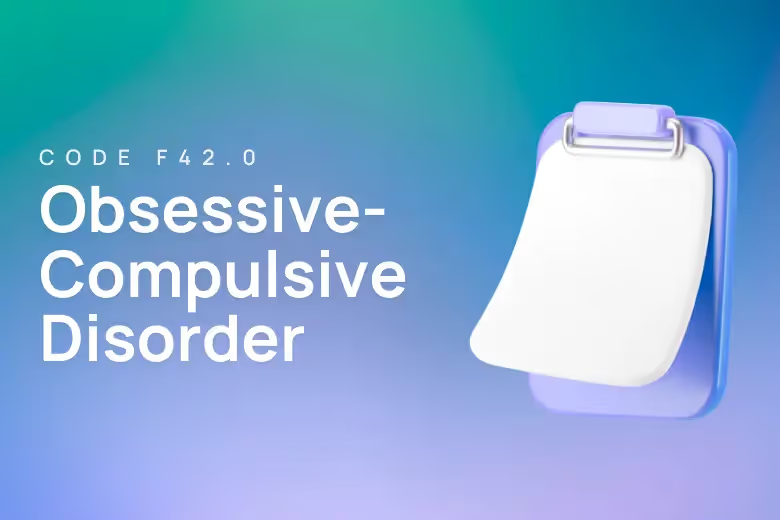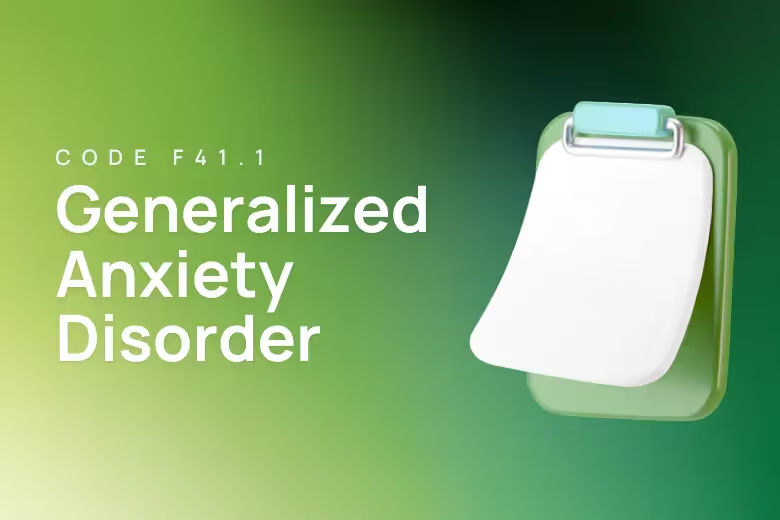ICD-10 code for alcohol use, unspecified, with unspecified alcohol-induced disorder

F10.99 is the ICD-10 code for alcohol use, unspecified, with unspecified alcohol-induced disorder.
This diagnostic code captures situations where there is evidence of alcohol use affecting functioning alongside an alcohol-related mental health condition, but where the specific severity of use or exact nature of the induced disorder cannot be fully determined.Accurate coding in these complex presentations helps ensure appropriate care planning and proper documentation for reimbursement.
Key features:
- Used when alcohol use disorders cannot be classified by severity
- Encompasses concurrent alcohol-induced mental health disorders that lack specific classification
- Essential for complex clinical presentations requiring specialized treatment approaches
- Allows for documentation of comorbid conditions affecting treatment planning

Diagnostic criteria for alcohol use with alcohol-induced disorder (F10.99)
When using F10.99, clinicians encounter presentations where alcohol consumption has created noticeable problems, but the clinical picture remains unclear in certain key areas.
This code applies when sufficient evidence exists of problematic alcohol patterns but the exact severity level cannot be established based on available information.
The underlying alcohol use must demonstrate patterns that lead to clinically significant impairment or distress within a twelve-month period.
These patterns typically include elements such as:
- consuming alcohol in larger amounts than intended
- persistent unsuccessful efforts to control consumption
- continued use despite awareness of physical or psychological problems being worsened by alcohol
Essential diagnostic requirements include:
- Evidence of problematic alcohol consumption patterns causing functional impairment
- Presence of an alcohol-induced mental disorder that affects cognitive, emotional, or behavioral functioning
- Insufficient information to specify the exact severity of alcohol use (mild, moderate, or severe)
- Inability to identify the specific type of alcohol-induced disorder present
- Clear temporal relationship between alcohol consumption and the development of psychiatric symptoms
- Symptoms that are not better explained by a primary mental health condition
When to use F10.99 diagnosis code
Proper application of F10.99 requires careful consideration of differential diagnosis, particularly when distinguishing between various alcohol-related conditions and determining appropriate coding specificity.
F10.99 vs F10.10 (Alcohol use disorder, mild)
When clinical presentation suggests problematic alcohol use but comprehensive assessment reveals only 2-3 diagnostic criteria being met clearly, F10.10 provides a more specific coding option.
F10.10 requires definitive identification of mild severity through systematic evaluation of all eleven diagnostic criteria for alcohol use disorder.
In contrast, F10.99 applies when the clinical picture suggests alcohol-related problems but insufficient information exists to count specific criteria or determine severity level.
F10.99 vs F10.20 (Alcohol use disorder, moderate or severe)
F10.20 represents a more precise diagnostic classification when assessment reveals 4 or more diagnostic criteria for alcohol use disorder. This code requires clear documentation of specific symptoms and their severity.
F10.99 becomes appropriate when alcohol-related problems are evident but the assessment cannot definitively establish whether the presentation meets criteria for moderate or severe classification, often due to incomplete information or unclear symptom presentation.
F10.99 vs F10.97 (Alcohol use, unspecified, with alcohol-induced persisting dementia)
F10.97 specifies a particular type of alcohol-induced disorder affecting cognitive functioning with persistent memory and intellectual impairment.
When clinical presentation clearly involves dementia-like symptoms directly related to alcohol use, F10.97 provides more specific coding.
F10.99 applies when alcohol-induced symptoms affect mental functioning but the exact nature of the induced disorder remains unclear or does not fit specific categories.
Related ICD-10 codes
- F10.10 Alcohol use disorder, mild
- F10.20 Alcohol use disorder, moderate
- F10.20 Alcohol use disorder, severe
- F10.97 Alcohol use, unspecified, with alcohol-induced persisting dementia
- F10.96 Alcohol use, unspecified, with alcohol-induced persisting amnestic disorder
- F10.94 Alcohol use, unspecified, with alcohol-induced mood disorder
- F10.95 Alcohol use, unspecified, with alcohol-induced psychotic disorder
Interventions and CPT codes for alcohol use with alcohol-induced disorder
Comprehensive diagnostic evaluation
Initial assessment forms the foundation of effective treatment planning when working with complex alcohol-related presentations. This evaluation establishes baseline functioning, identifies specific symptoms, and develops appropriate intervention strategies.
The comprehensive psychiatric diagnostic evaluation uses 90791 for the initial intake session. This allows clinicians to conduct thorough assessment of alcohol use patterns, identify potential alcohol-induced symptoms, and establish preliminary treatment goals.
Individual psychotherapy interventions
Evidence-based psychotherapy approaches provide essential support for individuals managing both alcohol use concerns and related mental health symptoms. These interventions address the complex relationship between substance use and psychological functioning.
Cognitive behavioral therapy represents a first-line intervention for alcohol-related concerns, helping clients identify triggers, develop coping strategies, and address underlying thought patterns.
Individual sessions can be billed using 90832 for 30-minute sessions, 90834 for 45-minute sessions, or 90837 for 60-minute sessions depending on the actual time spent in therapy.
Motivational interviewing techniques help resolve ambivalence about change and strengthen commitment to recovery goals. These sessions also use standard psychotherapy codes 90832, 90834, or 90837 based on session duration.
Family therapy approaches
Family involvement often plays a crucial role in supporting recovery from alcohol-related disorders. These interventions address family dynamics, communication patterns, and support system development.
Family therapy sessions are coded as 90846 when conducted without the patient present or 90847 when the patient participates in the session. These interventions help family members understand alcohol-related disorders and develop healthy response patterns.
Group therapy interventions
Group settings provide valuable peer support and shared learning opportunities for individuals working on alcohol-related concerns. These therapeutic communities help reduce isolation and provide practical skill development.
Group psychotherapy sessions are billed using 90853, covering various group formats including skills-based groups, relapse prevention groups, and peer support communities.
Screening and brief intervention services
Structured screening and brief intervention services help identify alcohol-related concerns and provide immediate support for behavior change.
For commercial insurance, 99408 covers structured screening and brief intervention lasting 15-30 minutes, while 99409 covers sessions longer than 30 minutes.
Medicare patients may use G0396 for 15-30 minute sessions or G0397 for longer interventions. Medicaid programs may require H0049 for alcohol screening and H0050 for brief intervention services.
How Upheal improves F10.99 ICD-10 documentation
Suggesting appropriate ICD-10 codes based on session content
Accurate coding for complex alcohol-related presentations requires careful attention to clinical details and symptom patterns.
Upheal's clinical documentation platform analyzes session content to identify key diagnostic indicators and suggest relevant ICD-10 codes based on the information discussed.
When clients present with alcohol-related concerns alongside mental health symptoms, the platform recognizes these patterns and offers coding suggestions that reflect the complexity of dual presentations.
This helps ensure that documentation captures both the alcohol use patterns and any induced disorders that may be affecting functioning.
Maintaining HIPAA-compliant records with proper diagnostic coding
Complex alcohol-related cases often involve sensitive information about substance use, family dynamics, and personal struggles.
Upheal maintains strict HIPAA compliance while organizing this information in clear, professional documentation that supports appropriate diagnostic coding.
The platform helps clinicians track symptom patterns over time, making it easier to determine when presentations meet criteria for more specific codes versus when F10.99 remains the most appropriate choice. This longitudinal view supports more accurate diagnostic decision-making.
Reducing administrative burden so you can focus on client care
Working with individuals who have both alcohol use concerns and related mental health symptoms requires significant clinical attention and therapeutic skill. Administrative tasks around documentation and coding can detract from the therapeutic focus needed for these complex cases.
By handling routine documentation tasks, Upheal allows clinicians to dedicate more energy to building therapeutic relationships, implementing evidence-based interventions, and addressing the multifaceted needs of clients managing alcohol-related disorders alongside other mental health concerns.
Supporting clients with alcohol use and alcohol-induced disorders
Individuals presenting with F10.99 diagnoses often require comprehensive, coordinated care that addresses both substance use patterns and related mental health symptoms.
These complex presentations benefit from integrated treatment approaches that recognize the interconnected nature of alcohol use and psychological functioning.
Treatment planning must consider the potential for alcohol-induced symptoms to resolve with sustained abstinence while also addressing any underlying mental health conditions that may persist.
This requires ongoing assessment and flexible treatment approaches that can adapt as the clinical picture becomes clearer over time.
The therapeutic relationship becomes particularly important in these cases, as clients may experience shame, confusion, or uncertainty about their symptoms.
Creating a safe, non-judgmental environment helps clients engage more fully in treatment and provides the foundation for long-term recovery success.
Providers who can focus their full attention on building these therapeutic connections often see better engagement and outcomes.
Upheal's clinical documentation platform helps behavioral health providers maintain thorough, compliant documentation while dedicating more time to the intensive therapeutic work these complex cases require.
Try Upheal for free to experience how streamlined documentation can improve your focus on client care.













